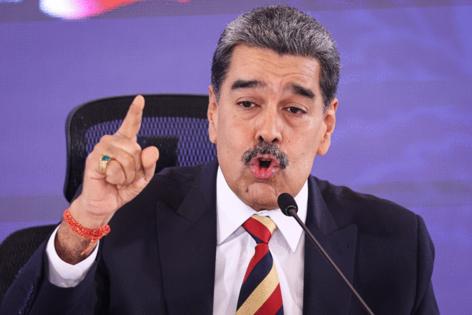Maduro's drug war push fails to relieve Trump's maximum pressure
Published in News & Features
Nicolas Maduro has tried writing a letter to Donald Trump. He offered to help the U.S. president round up criminals from the Tren de Aragua gang. He even sent his own troops to root out encampments of guerrillas to do his part on the war on drugs.
But so far, the Venezuelan president hasn’t been able to get Trump to back off a pressure campaign that seeks to pin Maduro as a cartel leader. On Friday, the U.S. disclosed that it had destroyed the fifth boat in the Caribbean in the past five weeks that it claims was transporting drugs destined for American shores.
Maduro has calibrated his reaction carefully. After the first strike, he questioned the veracity of the video of the bombing rather than the attack itself. Meanwhile, he continues to cooperate with the U.S. on other fronts. Venezuela still receives planeloads of deported U.S. migrants every week. Houston-based Chevron Corp. is still pumping oil in cooperation with the state-owned producer. Behind the scenes, representatives of Maduro are still talking to some U.S. officials and reaching out to others, people familiar with the matter say.
The question is whether a show of greater cooperation in Trump’s drug war will be enough to appease the U.S. president. Trump hinted this week that the U.S. focus could soon turn to interrupting the flow of drugs on land instead of just by sea, and some U.S. officials are exploring the idea of targeting sites related to narcotrafficking inside Venezuela, said the people, who asked not to be identified discussing private information. That’s a scenario the Venezuelan leader would like to avoid.
“Maduro is trying to do everything possible to avoid escalation,” said Geoff Ramsey, a Washington-based senior fellow at the Atlantic Council. “It’s difficult to believe that President Trump is willing to do anything that could risk destabilizing violence in Venezuela, and I think Maduro sees that red line as an opportunity for engagement.”
Venezuela’s Information Ministry didn’t respond to a request for comment.
The U.S. Navy has bulked up in the southern Caribbean with at least eight warships, at least one nuclear submarine, more than 4,000 troops, fighter jets, drones and surveillance planes. The show of force gives Washington the ability to surveil and strike targets deep inside Venezuela.
Caracas has scrambled to show it’s fighting narcotrafficking on its own terms. Defense Minister Vladimir Padrino issued a sudden, public mea culpa in early September, saying the government had fallen short in publicizing its antidrug fight. His now-weekly broadcasts feature the armed forces’ high command and detailed narrations of the latest operations.
On Thursday, the broadcast included several large-scale bombings of what they described as drug labs stashed with cocaine, firearms and detonators alongside Venezuela’s western border with Colombia. The camps, Padrino said, were managed by members of the FARC and ELN Colombian guerrilla groups, a rare acknowledgment by a Maduro official that such groups are operating inside Venezuelan territory.
Evan Ellis, a professor at the U.S. Army War College, said the operations could signal both an effort to control the border and “to placate the Trump administration by showing he’s acting against groups that have been a problem in the past.” In reality, stopping drugs from coming across the border from Colombia would only help so much because increasingly, production is happening in laboratories in Venezuela, he said.
The problem for Maduro is that goodwill hasn’t bought relief. In a news conference on Sept. 15, Maduro described conversations with the Trump administration as “broken,” citing “threats and blackmail” from the U.S. However, he said communications were “not at zero,” and referred to continued talks on migrants with U.S. Chargé d’Affaires for Venezuela John McNamara.
One of the challenges facing Maduro is that he’s wanted in the U.S. as a drug trafficker himself. The Trump administration has identified him as the head of a group called the Cartel de los Soles. Maduro was indicted by a grand jury in 2020, during the first Trump administration, for drug trafficking. The government increased the award for information leading to his arrest to $50 million this year. Maduro has denied being involved in the drug trade.
“The Trump administration is convinced that the regime is criminal and that they’re so tied in with drug trafficking organizations and foreign terrorist organizations that they cannot possibly disentangle themselves — that the fact that Maduro is doing counternarcotics is an oxymoron,” said Ryan Berg, director of the Americas Program at the Center for Strategic and International Studies in Washington.
At the same time, Maduro is using propaganda to rally supporters against U.S. pressure. State TV shows him in fatigues alongside elite troops with Russian-made rifles, while Interior Minister Diosdado Cabello trains young party activists on obstacle courses. Commercials feature AI-generated independence heroes urging enlistment, and fishermen are shown saying they would drop their nets and pick up weapons if needed.
“The longer this deployment continues, and the clearer it becomes that Venezuela’s military leaders are not going to overthrow Maduro themselves, Washington is going to have to decide whether to escalate or declare victory and move on,” the Atlantic Council’s Ramsey said.
©2025 Bloomberg L.P. Visit bloomberg.com. Distributed by Tribune Content Agency, LLC.







Comments